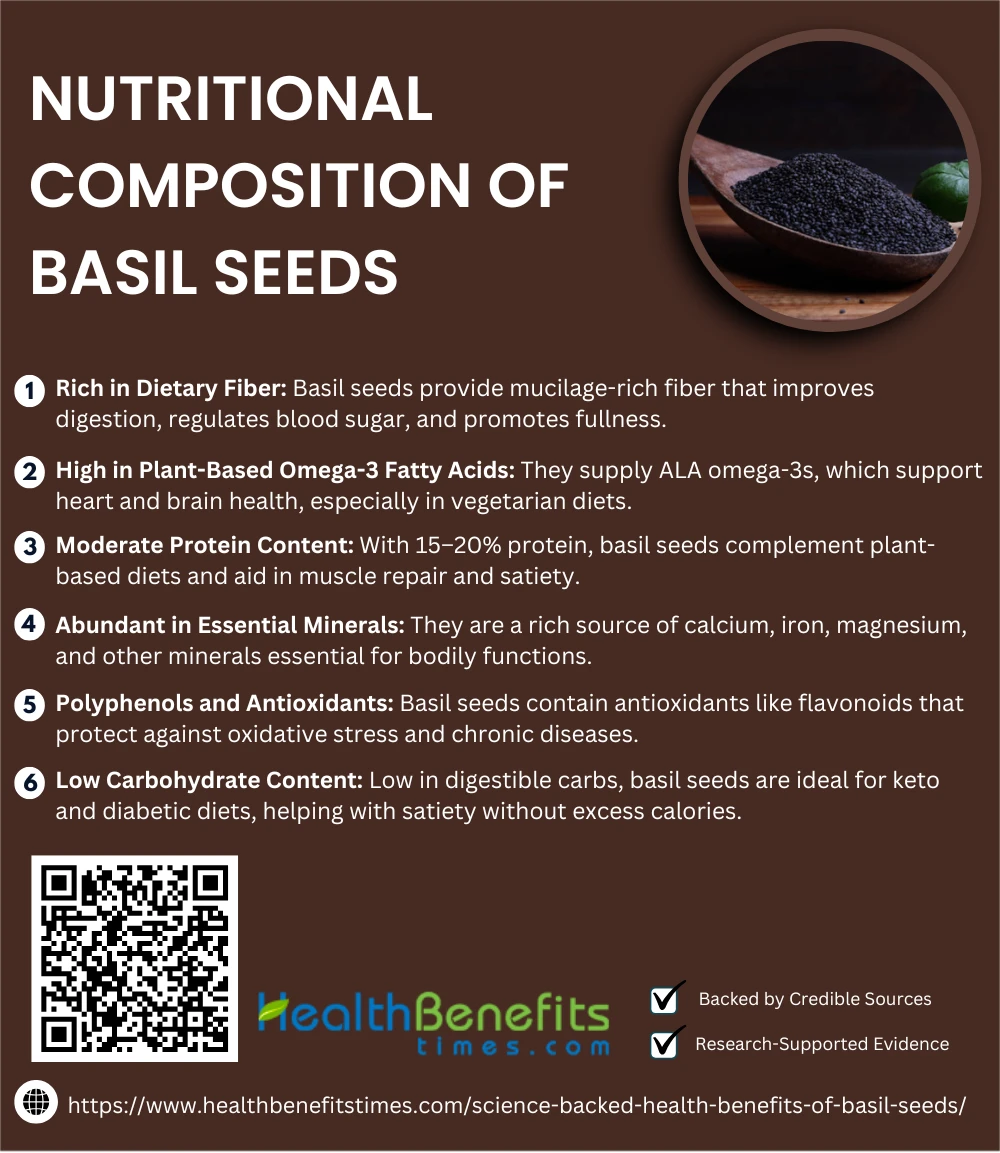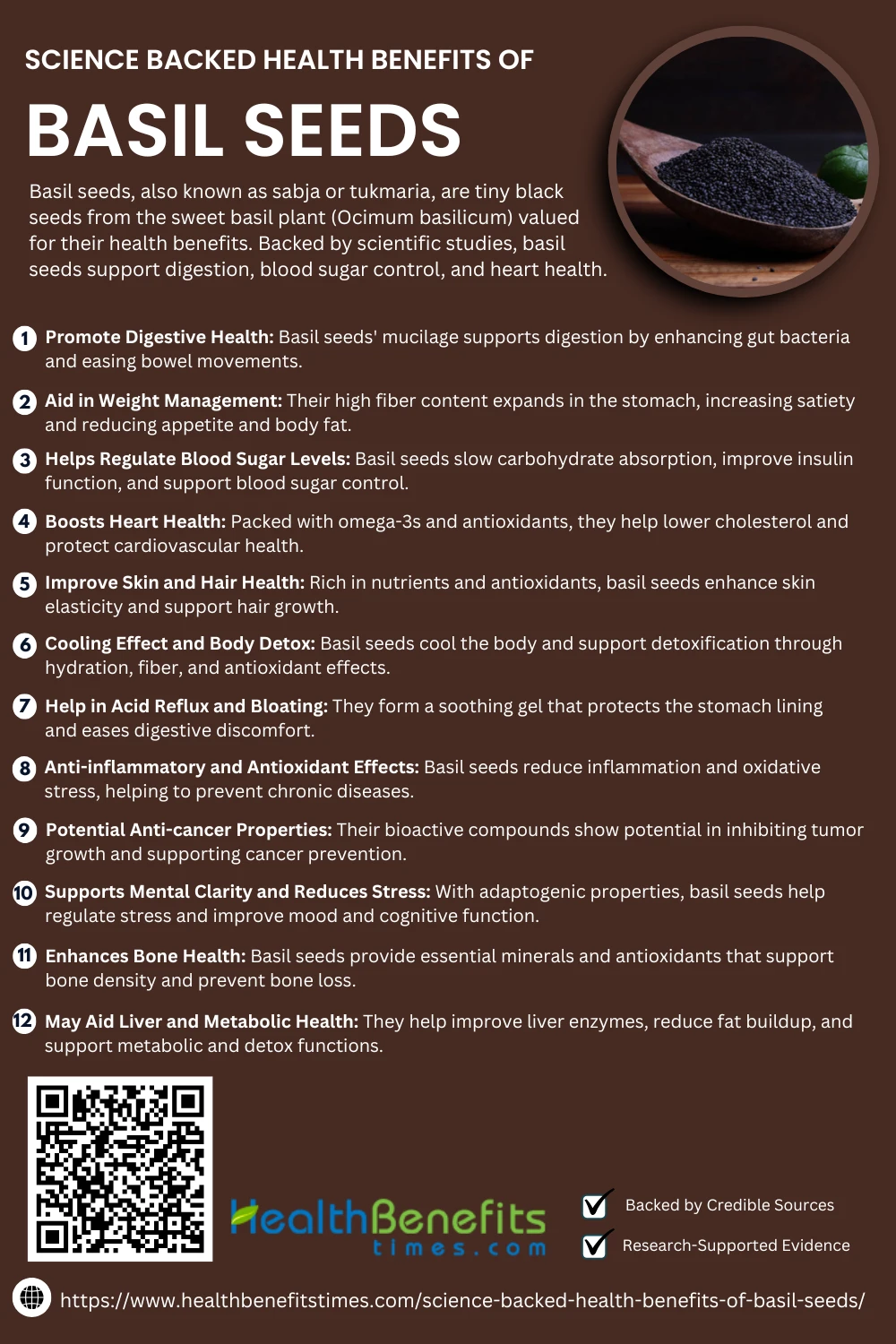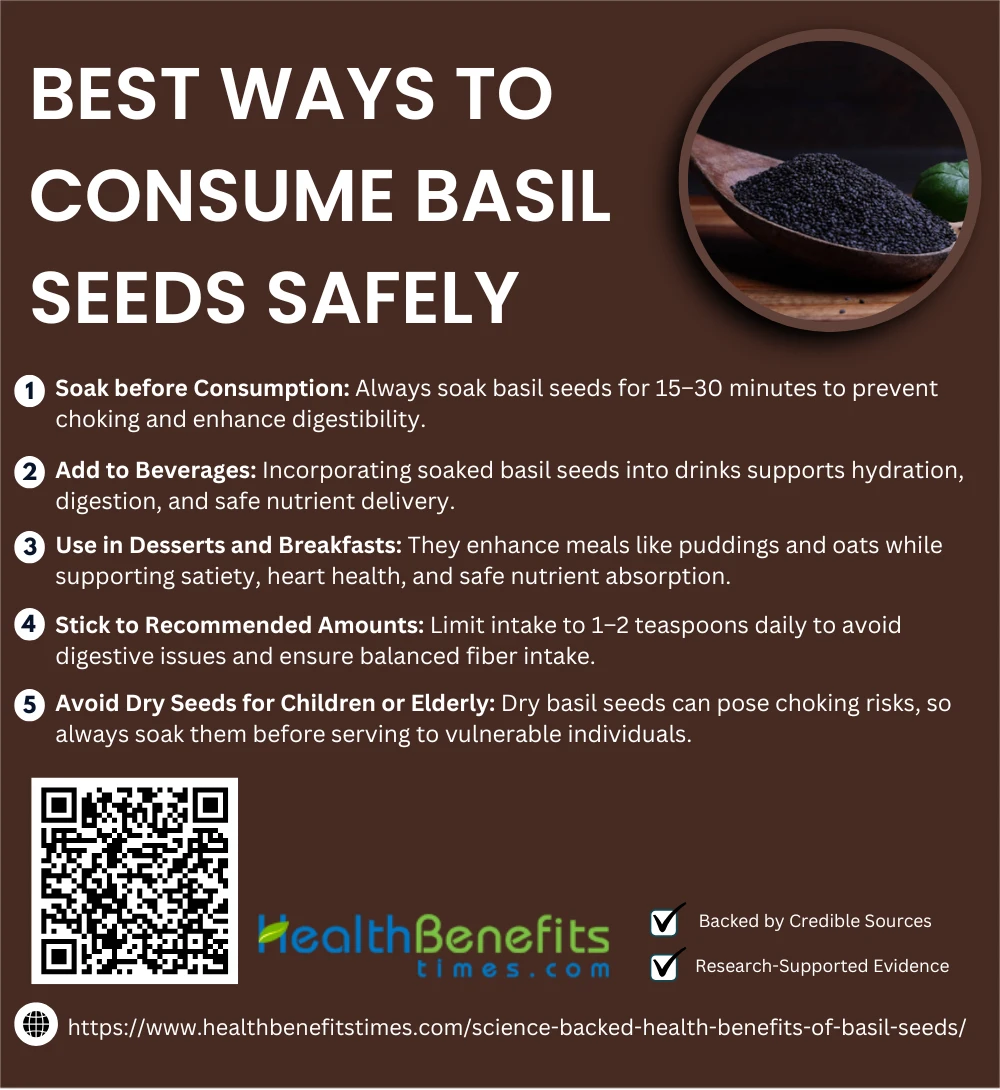- Basil seeds, also known as sabja or tukmaria, are tiny black seeds from the sweet basil plant (Ocimum basilicum) valued for their health benefits.
- Backed by scientific studies, basil seeds support digestion, blood sugar control, and heart health.
- Rich in fiber, omega-3s, and antioxidants, they are a nutrient-dense superfood ideal for natural wellness.
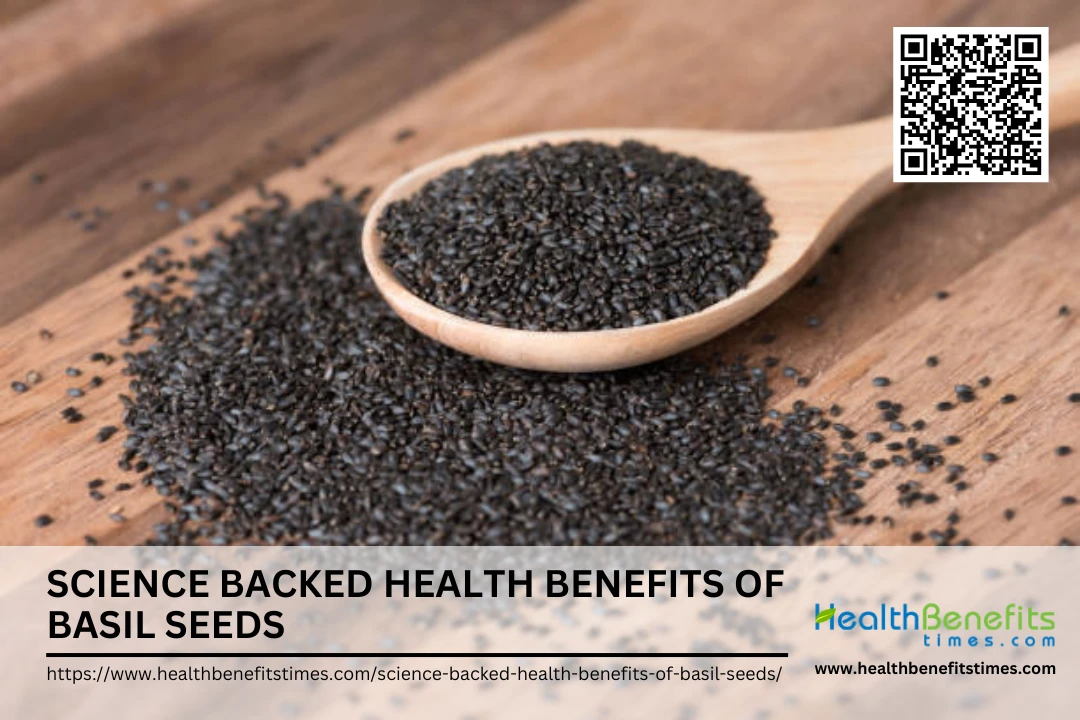 Basil (Ocimum basilicum) is an aromatic herb from the mint family, traditionally used in cuisines and herbal medicine worldwide for its distinctive flavor and potential therapeutic properties. In recent years, basil seeds—also known as Sabja or Tukmaria seeds—have gained recognition beyond traditional use due to their rich nutritional profile and potential health-promoting properties. Emerging scientific studies have highlighted their impressive content of dietary fiber, polyphenols, essential fatty acids, and bioactive compounds that contribute to a wide range of physiological benefits. Research supports their role in improving digestive health, managing blood glucose levels, aiding in weight control, and exerting antioxidant and anti-inflammatory effects. A recent study also demonstrated that incorporating basil seed flour into the diet significantly reduced insulin resistance and liver fat accumulation in mice, suggesting its promise in metabolic health. These findings place basil seeds firmly among nature’s functional foods, meriting further clinical exploration and dietary inclusion.
Basil (Ocimum basilicum) is an aromatic herb from the mint family, traditionally used in cuisines and herbal medicine worldwide for its distinctive flavor and potential therapeutic properties. In recent years, basil seeds—also known as Sabja or Tukmaria seeds—have gained recognition beyond traditional use due to their rich nutritional profile and potential health-promoting properties. Emerging scientific studies have highlighted their impressive content of dietary fiber, polyphenols, essential fatty acids, and bioactive compounds that contribute to a wide range of physiological benefits. Research supports their role in improving digestive health, managing blood glucose levels, aiding in weight control, and exerting antioxidant and anti-inflammatory effects. A recent study also demonstrated that incorporating basil seed flour into the diet significantly reduced insulin resistance and liver fat accumulation in mice, suggesting its promise in metabolic health. These findings place basil seeds firmly among nature’s functional foods, meriting further clinical exploration and dietary inclusion.
What Are Basil Seeds?
Basil seeds, botanically known as Ocimum basilicum, are the tiny black seeds of the sweet basil plant, which is native to tropical regions of Asia and Africa. Traditionally valued in Ayurvedic and Chinese medicine, these seeds are now gaining global popularity due to their dense nutritional content and functional properties. The seeds are oval, jet black, and become gelatinous when soaked in water—similar to chia but with distinct compositional and visual characteristics.
Though basil seeds are often compared with chia seeds, they differ notably in nutritional content and behavior. Basil seeds swell faster and absorb more water than chia seeds, forming a more robust mucilage layer. While chia seeds are higher in omega-3 fatty acids, basil seeds are often preferred for their cooling properties and higher mucilage yield. These distinctions influence their culinary and health-related uses. (1) (2)
Nutritional Composition of Basil Seeds
Basil seeds are packed with essential nutrients including fiber, protein, omega-3 fatty acids, and minerals. Their impressive nutritional profile supports overall health and makes them a valuable addition to your diet.
Basil seeds are an excellent source of soluble dietary fiber, particularly mucilage, which forms a gel-like layer when soaked in water. This fiber contributes significantly to digestive health by promoting regular bowel movements and aiding in the prevention of constipation. The high fiber content also helps regulate blood sugar and supports weight management through enhanced satiety. According to a study published in Nutrients, the mucilage in basil seeds plays a functional role similar to chia but with superior water absorption capacity.
2. High in Plant-Based Omega-3 Fatty Acids
Although not as concentrated as in chia, basil seeds contain alpha-linolenic acid (ALA), a type of omega-3 fatty acid essential for heart and brain health. These fatty acids have anti-inflammatory properties and may contribute to reduced cardiovascular risk. The seeds are especially valued in vegetarian diets as a non-animal source of essential fats. This has been confirmed by research comparing basil and other plant-based seeds for their oil profiles.
3. Moderate Protein Content
Basil seeds contain approximately 15–20% protein, making them a decent supplementary protein source for plant-based diets. This includes essential amino acids, though not in complete proportions. Still, when combined with other protein-rich foods, basil seeds can contribute to improved muscle repair, metabolism, and satiety. The same Springer study highlights the amino acid spectrum of basil seed proteins, noting their potential as functional food ingredients.
4. Abundant in Essential Minerals
These tiny seeds are loaded with calcium, magnesium, iron, potassium, and zinc, all of which play critical roles in bone health, nerve transmission, oxygen transport, and immune function. Basil seeds offer significantly higher mineral content compared to many common seeds, making them ideal for addressing micronutrient deficiencies, especially in low-meat diets. A comprehensive analysis in Foods journal supports their richness in mineral bioavailability.
5. Polyphenols and Antioxidants
Basil seeds are rich in polyphenolic compounds such as flavonoids and phenolic acids, which exhibit strong antioxidant properties. These compounds help neutralize harmful free radicals in the body, reducing oxidative stress and potentially lowering the risk of chronic diseases like cancer and cardiovascular conditions. The antioxidant profile of basil seeds has been well documented in phytochemical comparisons with chia and flax seeds.
6. Low Carbohydrate Content
Despite their gel-like swelling when soaked, basil seeds contain relatively low digestible carbohydrates, making them suitable for low-carb or ketogenic diets. The bulk of their volume when hydrated comes from water and mucilage, not starch, helping people feel full without excessive calorie intake. This quality supports their use in diabetic-friendly recipes and weight-conscious diets.
Comparison with other popular seeds (chia, flax)
Here is a side-by-side comparison table of Basil Seeds, Chia Seeds, and Flax Seeds based on their key nutritional and functional characteristics:
| Nutrient/Property | Basil Seeds | Chia Seeds | Flax Seeds |
| Dietary Fiber (g/100g) | 22 | 34 | 27 |
| Omega-3 Fatty Acids (ALA %) | 1.5 | 17.5 | 16 |
| Protein (g/100g) | 14 | 16 | 18 |
| Calcium (mg/100g) | 370 | 631 | 255 |
| Iron (mg/100g) | 2.3 | 7.7 | 5.7 |
| Magnesium (mg/100g) | 150 | 335 | 392 |
| Polyphenol Content | High | Moderate | High |
| Water Absorption Capacity | Very High | High | Moderate |
| Gel Formation Speed | Fast | Moderate | Slow |
| Carbohydrate (g/100g) | 43 | 42 | 29 |
Science-Backed Health Benefits of Basil Seeds
Scientific research highlights the remarkable health benefits of basil seeds, from aiding digestion to regulating blood sugar. These tiny seeds offer powerful wellness support backed by modern nutritional and medical studies.
Basil seeds are exceptionally rich in mucilage, a soluble fiber that supports gut health by easing bowel movements and nurturing beneficial gut bacteria. Studies show that basil seed mucilage acts as a potent prebiotic, enhancing microbial balance in the digestive tract. (3) This mucilage has been found effective in probiotic kefir beverages. (4) Additional research confirms improved gastrointestinal function through regular basil seed intake. (5) (6) (7)
2. Aid in Weight Management
Basil seeds are a powerful ally in weight control due to their high mucilage content, which absorbs water and expands, promoting prolonged satiety. Clinical studies show that basil seed consumption can significantly curb appetite and reduce body fat when consumed regularly. The seeds’ fiber-rich composition slows digestion and helps regulate glucose, reducing binge-eating triggers. (8) Human trials showed weight reduction in obese subjects consuming sweet basil seed extract. A review highlights their application in functional beverages to promote fullness. Moreover, their soluble fiber shows effects similar to fat substitutes in yogurt formulations aiding satiety. (9) (2)
3. Helps Regulate Blood Sugar Levels
Basil seeds are rich in soluble fiber and bioactive compounds that slow carbohydrate digestion, preventing sudden blood sugar spikes. Clinical findings indicate that incorporating basil seed flour into meals improves glycemic control in diabetic patients. (10) These seeds also modulate glucose metabolism through their phytochemical activity (ActaHort). Studies show antioxidant actions that support pancreatic function and insulin activity. (5) Tulsi variants, closely related to basil, demonstrate hypoglycemic effects in vitro and in vivo. (11)
4. Boosts Heart Health
Basil seeds contain essential nutrients like magnesium, potassium, and omega-3 fatty acids that support cardiovascular function by reducing arterial tension and regulating blood pressure. Their antioxidant-rich profile aids in minimizing oxidative stress and inflammation, both major contributors to heart disease. (2) Studies indicate that basil seed extract reduces serum cholesterol and LDL levels in animal models (8) Their mucilage has potential for reducing blood lipid buildup and improving vascular flow (12) Animal trials confirm improved lipid metabolism and reduced cardiovascular risk markers. Additionally, bioavailability of alpha-linolenic acid from basil seed oil has been positively linked with heart protection in experimental models. (13)
5. Improve Skin and hair Health
Basil seeds, packed with iron, flavonoids, and vitamin K, nourish hair follicles and improve skin elasticity. The antioxidants combat oxidative stress, which slows skin aging and reduces scalp inflammation.Their anti-inflammatory and antifungal properties also help treat dandruff and minor skin irritations. (14) A detailed review links basil-based oils to enhanced collagen production and hydration. (15) Basil extract’s use in traditional skin remedies is well documented, and studies confirm its role in herbal cosmeceuticals. (16) (2)
6. Cooling Effect and Body Detox
Basil seeds are prized in traditional and modern health systems for their natural cooling effect, making them a popular ingredient in summer beverages to reduce body heat and maintain hydration. Rich in fiber and mucilage, these seeds help cleanse the gastrointestinal tract and flush toxins from the body. (46) Their antioxidant content enhances liver function and detox pathways. (18) Studies confirm basil’s phytochemicals enhance enzymatic detox activity and contribute to a cooling, soothing effect on the digestive system. (19) (20)
7. Help in Acid Reflux and Bloating
Basil seeds exhibit demulcent and carminative properties that soothe the gastrointestinal tract, making them beneficial for acid reflux and bloating. Their mucilage forms a protective coating in the stomach lining, reducing acidity and discomfort. Basil’s volatile oils relieve flatulence and bloating symptoms (Wellbeing Journal). Research supports its role in managing GERD symptoms and easing gastric inflammation. (21) Additional data highlights its role in reducing bloating from herbal perspectives (SAAP Journal) and its traditional use in functional digestive remedies. (2)
8. Anti-inflammatory and Antioxidant Effects
Basil seeds are a potent source of flavonoids and polyphenols that counter oxidative stress and cellular inflammation. Studies confirm that their antioxidant properties protect cells from free radical damage and reduce pro-inflammatory cytokines, which is essential for preventing chronic illnesses. (22) Their gum (mucilage) also exhibits antioxidant and antiarthritic effects (LibraryNMU). Basil seed extracts have demonstrated anti-inflammatory activity in dental and tissue applications. (23) Other reviews validate its free radical scavenging capability comparable to common antioxidants. (2) This multifaceted biochemical activity positions basil seeds as a valuable tool for managing oxidative and inflammatory conditions. (3)
9. Potential Anti-cancer Properties
Basil seeds contain a range of bioactive compounds such as ursolic acid, eugenol, and flavonoids, which exhibit anti-carcinogenic effects by inducing apoptosis and inhibiting cancer cell proliferation. Studies show their extract can suppress tumor growth in experimental models. (24) Their phytochemical-rich oil has been linked with protective effects against skin and colon cancers. (25) Basil gum shows anticancer potential in functional nutrition applications. (26) Additional studies report cytotoxic effects on oral and breast cancer cells. (27) (28)
10. Supports Mental Clarity and Reduces Stress
Basil seeds exhibit adaptogenic properties that help the body manage physical and emotional stress. These effects are largely due to compounds like eugenol and rosmarinic acid, which regulate cortisol and protect neural function. (29) They also support adrenal health, enhancing focus and mood (Just Agriculture Tulsi Review). Clinical studies confirm reduced anxiety and improved cognitive parameters with basil seed extract use. (46)
11. Enhances Bone Health
Basil seeds contribute to bone health by supplying essential minerals like calcium, magnesium, and phosphorus, which are critical for maintaining bone density. Studies show basil’s phytoestrogens can prevent bone loss and promote osteoblastic activity in postmenopausal models (Effect of Basil on Bone Loss in Rats). Their rich antioxidant profile protects against oxidative bone damage. (8) Research also indicates that basil-based beverages can improve bone mineralization. (30) Tulsi, a related species, also improves bone health and calcium absorption. (31) A Springer study confirms anti-osteoporotic effects of basil in glucocorticoid-induced bone damage. (32)
12. May Aid Liver and Metabolic Health
Basil seeds (Ocimum basilicum) are increasingly recognized for their hepatoprotective and metabolism-boosting properties. These seeds help reduce systemic inflammation and improve liver enzyme profiles, supporting detoxification pathways. (47) Their fiber content aids in reducing hepatic steatosis and enhancing insulin sensitivity, particularly in metabolic syndrome conditions. (34) Flavonoids and phenolic compounds in basil protect liver cells from oxidative damage and modulate lipid metabolism. (35) Research also suggests improvements in cholesterol profiles and triglyceride levels. (36) Lastly, their bioactive oils regulate metabolic responses and protect against nonalcoholic fatty liver disease. (2)
Best ways to consume Basil Seeds safely
To enjoy basil seeds safely, it’s essential to soak them properly before use. This activates their nutrients, prevents choking, and makes them perfect for drinks, desserts, or healthy snacks.
To consume basil seeds safely, it is crucial to soak them in water for at least 15–30 minutes. This allows the seeds to expand and form a mucilaginous coating that prevents choking hazards and improves digestibility. Research confirms that proper hydration enhances mucilage development, improving safety and bioavailability. (37) (2)
2. Add to Beverages
Basil seeds can be safely incorporated into beverages due to their high mucilage content, which offers hydration and aids digestion. When soaked, they swell and form a gelatinous texture that enhances drinks like lemon water and smoothies. According to ScienceDirect, their rich fiber improves gut health. A Springer study highlights their antioxidant capacity, making them ideal for detox drinks. Furthermore, NCBI research confirms their antidiabetic and anti-inflammatory potential, promoting safe regular use in liquid diets. (38)
3. Use in Desserts and Breakfasts
Using basil seeds in desserts and breakfast items ensures slow nutrient release, supporting metabolic health. Their ability to absorb water enhances puddings, parfaits, and oatmeal. ScienceDirect notes they contribute to satiety, assisting weight control. A Springer article outlines their rich omega-3 profile, boosting heart health in morning meals. Additionally, NCBI findings confirm their safety and nutritional efficacy when integrated into regular diets like breakfast bowls or healthy desserts. (39)
4. Stick to Recommended Amounts
Overconsumption of basil seeds may lead to digestive discomfort or choking risk due to their high swelling capacity. Studies advise moderation—typically 1 to 2 teaspoons daily. ScienceDirect supports controlled intake for nutrient balance. Springer research emphasizes portion regulation to avoid fiber overload. NCBI confirms their safe use when amounts align with dietary guidelines. (40)
5. Avoid Dry Seeds for Children or Elderly
Dry basil seeds pose a choking hazard, especially for vulnerable groups like children or the elderly. Once ingested, they expand rapidly, risking airway blockage. ScienceDirect explains this swelling mechanism. Springer recommends pre-soaking to reduce risk. NCBI findings urge caution and hydration for safe consumption in these groups. (41)
Should consult a doctor before use?
Certain individuals should consult a doctor before using basil seeds, especially those with medical conditions, taking blood thinners, pregnant women, or people with allergies, to avoid potential side effects or interactions.
 1. People on Blood-Thinning Medications
1. People on Blood-Thinning Medications
Basil seeds may possess mild anticoagulant properties that could enhance the effect of blood-thinning drugs like warfarin. NCBI studies suggest caution to avoid excessive bleeding. (42) ScienceDirect highlights the plant’s phytochemicals affecting clotting. Springer reinforces the importance of medical advice to prevent interactions with medications.
2. Individuals with Low Blood Pressure
Basil seeds can promote vasodilation, potentially lowering blood pressure further in those with hypotension. ScienceDirect confirms their cardiovascular effects. (43) Springer warns of dizziness or fainting in sensitive users. NCBI research recommends prior consultation to ensure safe integration into the diet. (38)
3. Pregnant or Breastfeeding Women
Basil seeds contain phytoestrogens and bioactives that could potentially influence hormone levels, necessitating caution during pregnancy or lactation. NCBI research advises consulting a healthcare provider. ScienceDirect highlights uncertain effects on fetal development. Springer emphasizes the lack of robust data, warranting personalized guidance.
4. Children Under 5 Years
Dry basil seeds pose a choking risk due to their rapid expansion in the throat. NCBI documents such incidents in toddlers. (38) ScienceDirect recommends pre-soaking and supervision. A Springer study underlines the importance of pediatric consultation for safe use in young children.
5. Elderly with Swallowing Difficulties
Elderly individuals with dysphagia should avoid dry basil seeds, as their rapid swelling upon hydration can obstruct airways. NCBI reports choking incidents in older adults. (41) ScienceDirect emphasizes the need for pre-soaking and medical advice. Springer recommends physician consultation for those with impaired swallowing reflexes.
6. People with Digestive Disorders (e.g., IBS)
Due to their high fiber content, basil seeds may aggravate symptoms in individuals with IBS or chronic bloating. NCBI advises medical oversight for sensitive gastrointestinal conditions. (44) ScienceDirect notes fiber-induced gas formation. Springer recommends moderation and professional evaluation before use.
7. Individuals with Allergies to Seeds or Plants in the Lamiaceae Family
Basil seeds, derived from plants in the Lamiaceae family, may trigger allergic reactions in sensitive individuals. NCBI reports rare but serious hypersensitivity cases. (44) ScienceDirect warns about cross-reactivity with other mint-family herbs. Springer stresses medical consultation before consumption to prevent allergenic complications. (45)
Possible side effects of basil seeds
While basil seeds are generally safe, they may cause side effects like bloating, choking if not soaked, or interactions with medications. Awareness of these risks ensures safe and healthy consumption.
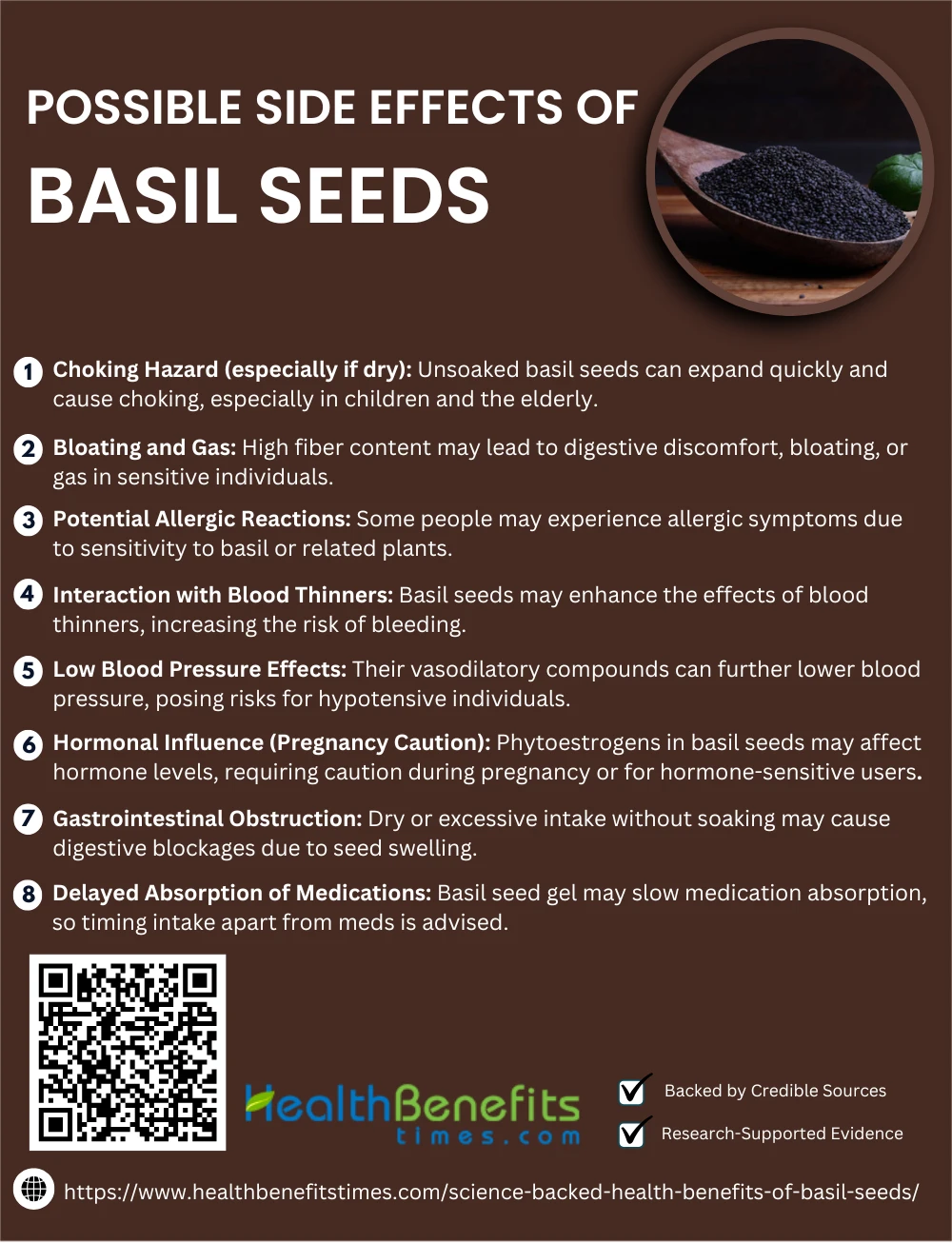 1. Choking Hazard (especially if dry)
1. Choking Hazard (especially if dry)
Dry basil seeds rapidly expand when hydrated, making them a choking hazard if consumed without soaking. NCBI highlights reported incidents in children and the elderly. (41) ScienceDirect explains their mucilaginous expansion. Springer recommends pre-soaking and supervision for safe intake.
2. Bloating and Gas
The high soluble fiber in basil seeds can lead to bloating and flatulence in some individuals. ScienceDirect connects fiber intake to gastrointestinal gas. Springer notes discomfort in those with sensitive digestion. NCBI advises starting with small amounts to assess tolerance. (44)
3. Potential Allergic Reactions
Some individuals may experience allergic reactions to basil seeds, particularly those sensitive to the Lamiaceae plant family. Symptoms can include skin rashes, itching, or respiratory distress. NCBI outlines allergenic compounds in basil. (44) ScienceDirect mentions cross-reactivity risks. Springer emphasizes pre-testing for individuals with known herbal allergies. (45)
4. Interaction with Blood Thinners
Basil seeds may possess mild anticoagulant properties, potentially enhancing the effects of blood-thinning medications. This raises the risk of bruising or bleeding. NCBI warns of drug interactions. (42) ScienceDirect discusses phytochemicals impacting clotting. Springer recommends consulting a physician for those on anticoagulant therapy.
5. Low Blood Pressure Effects
Basil seeds may lower blood pressure due to their vasodilatory compounds, which can pose risks for hypotensive individuals. ScienceDirect describes their cardiovascular relaxing effects. (43) NCBI confirms caution in hypotensive users. (38) Springer recommends monitoring blood pressure when incorporating basil seeds into the diet.
6. Hormonal Influence (Pregnancy Caution)
Basil seeds contain phytoestrogens that may affect hormonal balance, particularly in women. This influence could impact menstrual cycles or pregnancy. NCBI identifies phytoestrogenic activity in basil. ScienceDirect warns about endocrine interaction. Springer advises caution for individuals with hormone-sensitive conditions.
7. Gastrointestinal Obstruction
Excessive consumption of dry basil seeds without adequate hydration may lead to gastrointestinal obstruction. Their mucilaginous coating swells, potentially blocking the digestive tract. NCBI documents such cases. (41) ScienceDirect advises pre-soaking. Springer highlights risks in elderly or constipated individuals.
8. Delayed Absorption of Medications
The soluble fiber in basil seeds forms a gel that can slow the absorption of oral medications, reducing their efficacy. ScienceDirect discusses fiber’s effect on drug bioavailability. Springer recommends spacing out intake. NCBI suggests a time gap between basil seeds and medications. (44)
Conclusion
Basil seeds, often overshadowed by chia seeds, are a powerhouse of nutrition backed by science. Rich in fiber, antioxidants, and essential fatty acids, they support digestion, weight management, heart health, and blood sugar control. Their traditional use in various cultures now finds validation in modern research, making them a smart addition to a balanced diet. However, safe consumption is key—always soak them before use and consult a healthcare provider if you have underlying conditions. Whether added to drinks, desserts, or smoothies, basil seeds offer a simple yet effective way to enhance your overall wellness naturally and deliciously.


